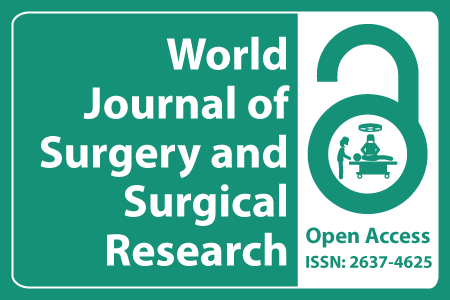
Journal Basic Info
- Impact Factor: 1.989**
- H-Index: 6
- ISSN: 2637-4625
- DOI: 10.25107/2637-4625
Major Scope
- Cancer Surgery
- Anesthesiology
- Cardiac Surgery
- Hand Surgery
- Minimal Invasive Surgery
- Dental Surgery
- Cardiothoracic Surgery
- Hepatology
Abstract
Citation: World J Surg Surg Res. 2024;7(1):1556.DOI: 10.25107/2637-4625.1556
Follow-Up after Treatment for Differentiated Thyroid Cancer – The Risk of Recurrences
Hedbäck GM
Department of Surgery, Institute of Clinical Sciences, University of Gothenburg, Sweden
*Correspondance to: Gunilla M Hedbäck
PDF Full Text Research Article | Open Access
Abstract:
Background: Differentiated Thyroid Cancer (DTC) is characterized by a good prognosis, and radical surgery has been questioned, especially in cases with small tumors. But size alone cannot possibly predict the prognosis: All tumors were small once. Recurrences occur after several decades, and further risk factors are needed when to choose the optimal treatment. Methods: A consecutive series of 231 patients with DTC were treated in 2004-2016: In 63/231 (27.3%) there was no preoperative suspicion of malignancy; 214 patients were thyroidectomized. Follow-up was performed in 2023 after mean 10.7 years (range 6.5-19.1). Medical records were scrutinized: Mode of surgery, radioiodine treatment, thyroglobulin levels, deaths and recurrences were registered as were possible risk factors. Patients with negative thyroglobulin after treatment were compared with those who had measurable thyroglobulin or high levels of anti-thyroglobulin. Results: There were 181 patients with negative thyroglobulin after treatment and 33 patients had measurable thyroglobulin and/or anti-thyroglobulin. All 15 patients deceased in DTC were in the latter group. Significance was confirmed for five risk factors: Size, multifocality, angioinvasion, extra-thyroidal growth and metastases. All ten patients with recurrences had minimum two of these risk factors, which also were found in microcarcinomas (≤ 10 mm). Complication rate was low. Conclusion: There is good reason for thyroidectomy or hemithyroidectomy in DTC, preferably including the closest lymphatic glands. Thyroidectomy has the advantage of follow-up with thyroglobulin tests, useful even after several years, to alleviate anxiety and to possibly find recurrences in time for treatment.
Keywords:
DTC; Follicular tumor; Oncocytic carcinomas
Cite the Article:
Hedbäck GM. Follow-Up after Treatment for Differentiated Thyroid Cancer – The Risk of Recurrences. World J Surg Surgical Res. 2024; 7: 1556..













